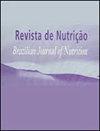Effect of açai supplementation (Euterpe Oleracea Mart.) associated with exercise in animals and human: a scoping review
IF 0.5
4区 医学
Q4 NUTRITION & DIETETICS
Revista De Nutricao-brazilian Journal of Nutrition
Pub Date : 2022-01-01
DOI:10.1590/1678-9865202235e210266
引用次数: 0
Abstract
ABSTRACT Objective This scoping review aimed to map evidence on açai supplementation combined with exercise in animal and/or human experimental studies. Methods The search considered six electronic databases and screening of relevant references. The selection process and data extraction were performed by two independent authors. The study characteristics, and AS (e.g., form, intervention time, amount ingested) and exercise (e.g., types, intensity, and duration) strategies were summarized, as well as their reported results. Results From an initial total of 342 studies identified; 11 (5 with animal and 6 with human models) were eligible. In animals, açai supplementation and exercise led to benefits in exercise tolerance and improvements in several hemodynamic parameters, as well as significant improvements in liver markers and glucose metabolism. In humans, açai supplementation indicated positive results in increasing exhaustion time to 90% of VO2max and increasing intensity at the anaerobic threshold. Conclusion We conclude that future research involving animals and humans should examine açai supplementation and exercise with (a) obesity models to test the effect of adiponectin on body composition with analysis of histological and histochemical parameters; (b) eccentric injury protocols with the incorporation of muscle quality variables to assess recovery; (c) chronic açai supplementation and strength training; (d) comparison of different forms of açai supplementation in exercise protocols.在动物和人类中,与运动相关的阿帕拉泰补充剂(Euterpe Oleracea Mart.)的作用:一项范围审查
【摘要】目的:本综述的目的是在动物和/或人体实验研究中寻找与运动相结合的阿帕拉泰补充剂的证据。方法检索6个电子数据库,筛选相关文献。选择过程和数据提取由两位独立作者完成。总结了研究特点、AS(如形式、干预时间、摄食量)和运动(如类型、强度和持续时间)策略及其报告结果。从最初确定的342项研究中;11例(动物模型5例,人体模型6例)符合条件。在动物实验中,补充阿帕拉泰和运动可以提高运动耐量,改善一些血液动力学参数,并显著改善肝脏标志物和葡萄糖代谢。在人类中,补充阿帕拉ai显示出将消耗时间增加到90% VO2max和增加无氧阈值强度的积极结果。我们得出结论,未来的动物和人类研究应该通过(a)肥胖模型来检验脂联素的补充和运动,通过分析组织和组织化学参数来测试脂联素对身体成分的影响;(b)纳入肌肉质量变量评估恢复的偏心损伤方案;(c)长期补充营养和力量训练;(d)比较运动方案中不同形式的碘补充。
本文章由计算机程序翻译,如有差异,请以英文原文为准。
求助全文
约1分钟内获得全文
求助全文
来源期刊
CiteScore
1.20
自引率
12.50%
发文量
24
审稿时长
6-12 weeks
期刊介绍:
Revista de Nutrição is former Revista de Nutrição da Puccamp, founded in 1988. It is a bimonthly publication every four months and it is of responsibility of the Centro de Ciências da Vida, da Pontifícia Universidade Católica de Campinas . It publishes articles that contribute to the study of Nutrition in its many sub-areas and interfaces; and is open to contributions of the national and international scientific communities.

 求助内容:
求助内容: 应助结果提醒方式:
应助结果提醒方式:


